Newspaper headlines: Concerns over plan to quarantine travellers to UK
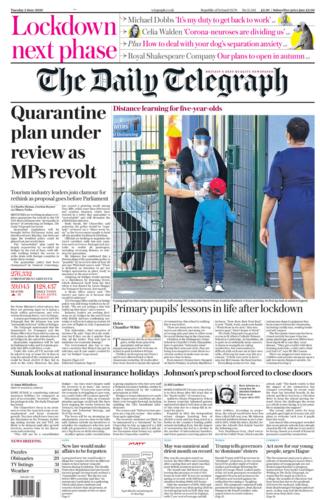
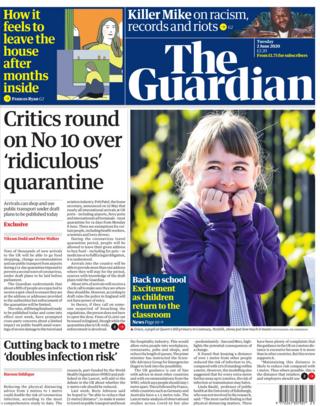
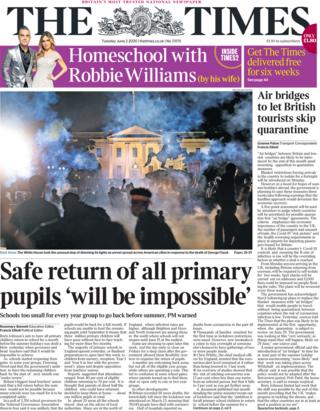
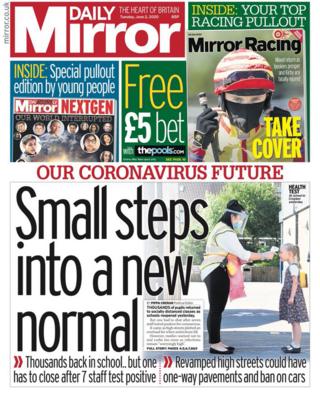
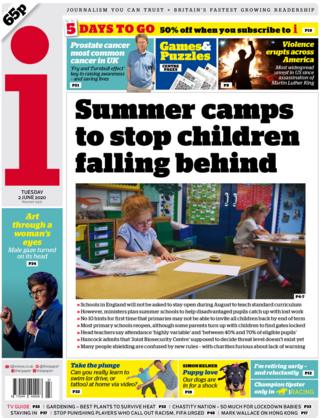
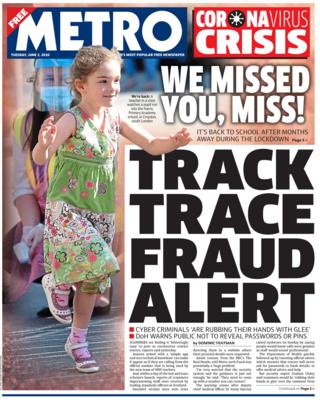
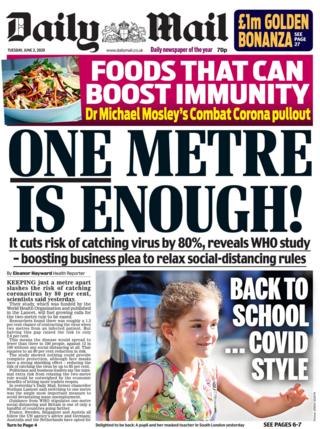
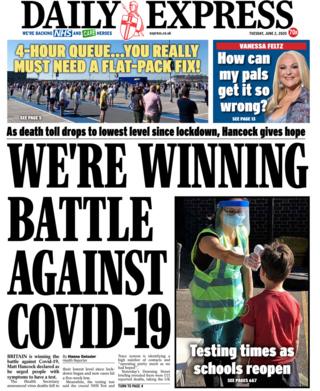
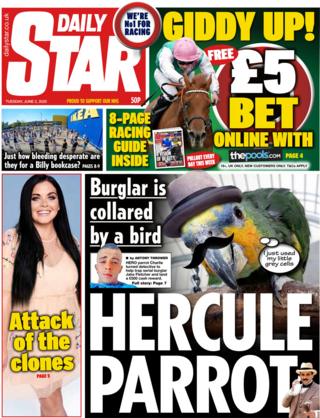
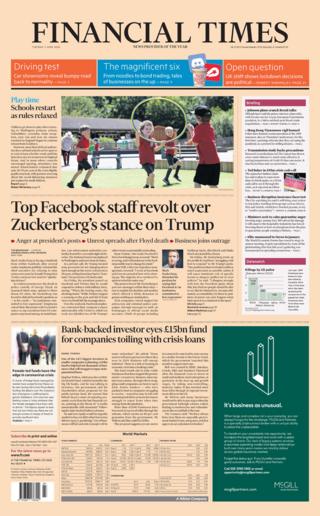
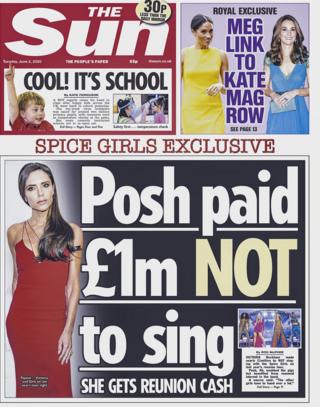
The hostility towards the government's plans to impose a 14-day quarantine on people coming into the UK makes the front of the Daily Telegraph.
It reports the "troubled policy" has been championed by the prime minister's chief aide, Dominic Cummings, but he has lost the battle within the government and the measure could be phased out just weeks after being introduced.
Boris Johnson, it says, is now personally in favour of "air bridges" instead - allowing people to jet to and from low-risk countries.
According to the Times, up to 20 Conservative MPs are believed to oppose the quarantine plan, with tourism chiefs warning that it could put thousands of companies out of business.
The Sun says the measure will kill tourism and business arrivals, pointing out Gatwick Airport currently has just 23 passengers a day.
Meanwhile, the Daily Mail asks why Britain is imposing a quarantine, when other European countries are lifting theirs. Ministers insist their decisions have been based on the latest scientific advice.
Back to school
Many front page pictures try to capture the new reality faced by children as they returned to school in England.
"Small steps into a new normal," is the Daily Mirror's headline alongside a photo of a teacher wearing a protective mask and apron as she takes the temperature of a girl arriving for class.
The i newspaper shows children working on separate desks more than two metres apart.
The Telegraph describes how children had to practise "helicopter arms", rotating them to make sure no-one was too close to them.
It adds: "Teddy bears were placed in quarantine and there were no more playground games of It... welcome to school in post-lockdown Britain."
The Times says that concerned parents kept up to 60% of children who were eligible to return to primary school in England at home.
However, the Mail thinks this was "quite an achievement" in the face of what it describes as the "scaremongering of teaching unions and their cheerleaders on the Left".
The children who did attend are pictured socially distancing in the playground. In the Telegraph's Matt cartoon, a boy proudly shows his mum a star which has been pinned to his chest. "I got this for not joining in or sharing," he says.
"One metre is enough!" exclaims the Daily Mail on its front page. It reports on a study funded by the World Health Organisation that says there is roughly a 1.3% chance of contracting the virus when two metres away from an infected person.
However, says the Mail, if you halve this gap to one metre the risk is only raised to 2.6%. It says the findings will boost the plea from business to relax the social distancing rules.
The Sun suggests that adopting a one metre rule would pave the way for pubs to reopen, and it pictures what they could look like.
Its model suggests drinkers would have to follow a one-way system, bar staff would be behind perspex screens and only cashless payments would be accepted.
The Mirror warns that with no vaccine, sticking to the two metre rule is the best protection against an unseen deadly enemy.
The lockdown measures may have been eased, but the Times reports that traders at Camden Market in north London had a very slow start on Monday. By lunchtime, none of the stallholders who spoke to the paper had made a sale.
Sign up for a morning briefing direct to your inbox
The idea that a second wave of coronavirus could overwhelm the NHS faces serious questioning from Prof Hugh Pennington, one of the country's leading experts on bacteria.
Writing in the Telegraph he argues the notion comes almost entirely from the 1918 Spanish flu pandemic - and Covid 19 is very different. He also points out there has not yet been a second wave in China, South Korea or New Zealand.
Meanwhile, in an editorial, the Times argues that the NHS needs reform - even before the pandemic ends.
It says health service staff deserve praise for their work and sacrifices, but the crisis has highlighted several problems including rationing, outdated buildings which will prevent effective social distancing and staff shortages.
The paper believes some of the difficulties could be solved with more money - but it calls for radical change to the institution's structure, bringing health and social care together.
The i newspaper's editor predicts the United States faces a "long, angry summer". Oliver Duff, like many other commentators, draws a comparison between the current unrest and the rioting that followed the assassination of Martin Luther King in 1968.
The Guardian believes that against the backdrop of 100,000 coronavirus deaths a "dangerous" moment looms for America.
It says the chaotically handled pandemic and the economic fallout has already disproportionately affected African Americans - long before the death of George Floyd at the hands of the police.
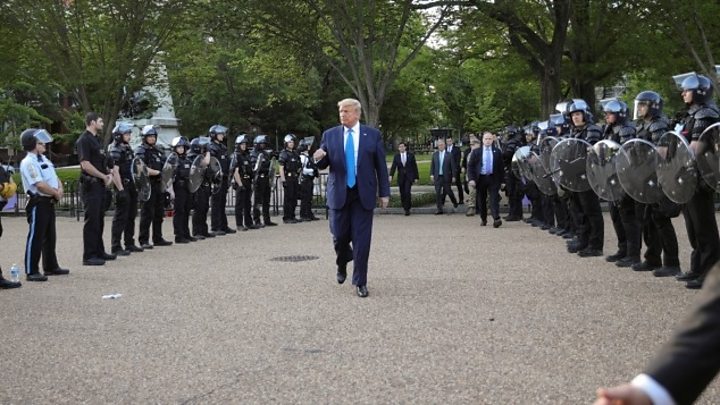
The green-fingered are being called upon to spot the next Japanese knotweed menace, according to the Telegraph.
It reports the Botanical Society of Britain and Ireland wants keen gardeners to keep an eye on species which show signs of invasiveness, and report them using a special app.
The paper recalls how Japanese knotweed originated as an ornamental garden plant, before it started causing havoc to homes and waterways.
And if the lockdown's been enough to make you go grey, then there is hope in the Mail.
It covers an American study which found that hair can return to its natural colour - by putting an end to stress.
The authors found a man in his 30s saw his hair go back to being dark again, when he went on holiday for a couple weeks; while a 30-year-old woman who went grey when her marriage was ending returned to her normal colour once it was over. It prompts the paper to ask: "Could a divorce make your greys go away?"